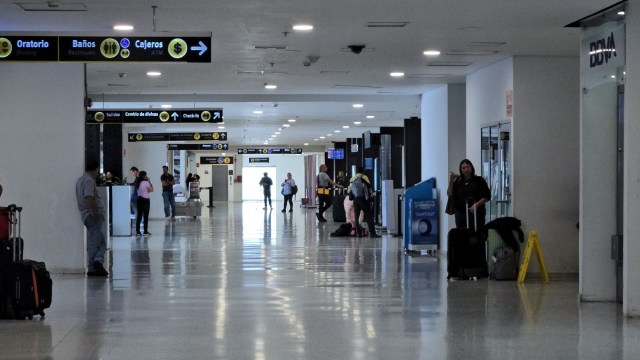
The complex humanitarian crisis that Venezuela has been suffering in recent years was the main reason that forced millions of Venezuelans to escape to other countries in search of opportunities and be able to access medicines, treatments and food. But after the presidential elections on July 28th, fear became the main cause that would be generating a new and increased migratory flux on the Táchira border.
By: Luz Dary Depablos / Correspondent lapatilla.com
Although the main roads that connect San Cristóbal with the Colombian border are in terrible condition, citizens from central and eastern Venezuela continue to choose Táchira as an option to leave the country, mainly because the diplomatic break with some countries has also influenced the suspension of flights from Maiquetía to other destinations, so travelers must travel overseas through Colombia.
In recent days, at the Cipriano Castro airport, located in the border Municipality of Bolívar, Venezuelan domestic flights were enabled between Valencia – San Antonio del Táchira, as well as Barquisimeto – San Antonio. This is the town where the largest number of passengers cross the border into Colombia to continue to their destination in third countries.
At the Camilo Daza airport, located in the city of Cúcuta, international flights have increased since last August. Previously, they only offered one weekly flight, but due to the demand from Venezuelans after the month of July, the number of weekly flights increased to four. The most requested destinations are Panama, Miami and others in Europe.
It should be noted that in mid-August, up to two flights were registered on the same day and some people had to wait because the tickets had sold out.
In October, the Cúcuta airport plans to start flights covering the route Arauca – Cúcuta – Maracaibo, through Satena (a Colombian state company), while Avianca does not rule out that by the end of October they could increase the number of flights between Cúcuta and Bogotá given the demand that continues to grow on the part of Venezuelans.

Back and forth crossings decrease
William Villamizar, Governor of the border department of Norte de Santander in Colombia, told the lapatilla.com team: “We have set up a Unified Command Post that has actions (plans) in place and concluded that the outcome in Venezuela could generate mass migration, there is a yellow alert in hospitals so that the public and private network can attend to them. We have emergency humanitarian aid from the government and international organizations to attend to these migrants.”
The governor explained that before the electoral process on July 28th, between 50,000 and 60,000 people were crossing the border daily on international bridges, that is, “they were entering and leaving again. Today this (pendulum migration) has decreased by an average of 35,000 people entering and leaving; 33,000 (return to Venezuela) and 1,500 stay (legally after stamping their passport), some go to the center of the country, others stay a few days and return after a while.”
“The cost of care for Venezuelan migrants is around 250 billion pesos (approximately 65 million 800 thousand dollars), of which the national government has only paid about 50 billion pesos (13 million dollars), that is, there is a debt for the provision of healthcare services to Venezuelans of 200 billion pesos, which represents almost 90% of the Erasmo Meoz University Hospital expenses, a situation that keeps it in crisis,” added the governor of Norte de Santander.

Greater support from the Colombian government
Likewise, Renson Jesús Martínez, Governor of the Department of Arauca (bordering the state of Apure), told lapatilla.com that according to the latest records, they have 77,000 migrants of Venezuelan origin, who have received assistance in terms of healthcare and education, which in turn represents a budgetary effort for the departmental government.
Recently, they requested greater support from the government of Gustavo Petro to assist Venezuelan migrants in the border departments, due to “the strong migration process that we have attended to in recent years, specifically in the border area, in the department of Arauca, Norte de Santander, Boyacá and Vichada.”
“The phenomenon continues to be gradual, permanent, we have the presence of people from Venezuela for different reasons, especially regarding the internal situation that is being experienced from the political point of view. We hope that it can be resolved so that this can also contribute to the improvement of bilateral relations between two sister countries, which have many things in common,” said the governor of Arauca.
“The reestablishment of political relations between the two countries is important. We do not lose confidence in that, but it is also necessary that the national government (Gustavo Petro) reestablish dialogue with these armed groups, especially the ELN (Ejército de Liberación Nacional, National Liberal Army) that is present in this area of the border and that causes a lot of damage due to the terrorist acts that have occurred in recent days,” said Renso Martínez.

Migrants without documents
On the other hand, Lieutenant Colonel Leonardo Cárdenas, Operational Commander of the Metropolitan Police of Cúcuta, said that they have held working meetings with Migración Colombia, “in order to carry out a more rigorous control on the issue of migrants.”
“The idea is to have a more thorough control of this migration issue,” said the Commander of the Police of Cúcuta. He also stressed that through the mayor of the city of Cúcuta they would be identifying some illegal crossings of Venezuelan migrants. “A more rigorous control is being carried out in the early hours of the morning (…) We are trying to attack those irregular sites.”
He also explained that migratory movements are relative, “it remains constant some days, it increases on weekends.” He pointed out that generally Venezuelan migration is constant, “many of them come even without documents.”

